Do You Have Any Thoughts On Yunmeng Bros And Moral Differences? Like, Golden Core/shijie/broken Promises
do you have any thoughts on yunmeng bros and moral differences? like, golden core/shijie/broken promises aside, what about the fact that jc (and every other cultivator) was ready to let all wens be killed? like i love my sibling to death but if i found out that she was okay with standing aside while innocents were slaughtered (or even if she wasn't okay, that she WOULD) and telling me to just not care about the injustices in the world, i would never be able to look at her the same way ever again
god, do I have feelings about these moral differences or what...
so first of all, let’s start with a quick acknowledgment of cultural bias when it comes to morality and moral priorities in CQL; for those of us in the U.S., we’ve been having a lot of conversations lately about silence and complicity and the responsibility of the individual to effect change in the society they participate in. Let’s take a moment to recall that this is a very U.S.-centric conversation, and thus, cross-applying our standards of complicity vs. action and the relative moralities thereof to a fundamentally non-Western text is already something that should be raising eyebrows.
You with me still?
Great, now let’s talk about young sect leaders Lan Xichen and Jiang Cheng, and why they cannot make the same decisions that our protagonists can make.
One of the things I find most compelling about Lan Xichen and Jiang Cheng as characters is that their lives are not their own. I think it’s important to realize what it means for those two to be sect heirs: they are born into leadership. They carry responsibility from the moment they come into the public eye. This is something that is especially important to grasp if you’re coming from an environment like, say, the U.S. -- because democracy, there is generally the assumption that if someone is a politician, it’s because they chose to become a politician. They wanted to do this. No one is forcing you to run for office; no one is compelling you to take up the burdens of governance and administration. You choose this fight.
This is not so with hereditary sect leadership.
Jiang Cheng and Lan Xichen are born into their roles; they are trained for this from birth, told that the purpose of their lives will be to lead their sect, and lead it well. Don’t mistake me -- it is undoubtedly an honor and a privilege to be a sect leader, for material reasons and power/influence reasons and fame/legacy/reputation reasons, but the key thing to note here is that, from birth, sect heirs are defined not by their individuality, but their future role.
This is why Jiang Cheng is such a killjoy in Gusu summer school and evil Wen summer camp; sure, Wei Wuxian is just being Wei Wuxian, and that’s just how he is -- lovable, mischievous, a bit of a scamp and a troublemaker -- but Jiang Cheng is the future sect leader of Yunmeng Jiang. Wei Wuxian’s conduct reflects on Jiang Cheng, and on Yunmeng Jiang’s reputation.
Jiang Cheng’s life is not his own.
In 《清平乐》Qingpingyue / Serenade of Peaceful Joy, a period drama about the life and times of 宋仁宗 Emperor Ren of Song, the narrative (at least for the first ten episodes, tbd if I make it through the next, uh, sixty) is heavily preoccupied with the question of how personhood can survive in the stifling environment of leadership. Time and time again, our young emperor has to confront the consequences of his actions, the limitations of his freedom, because he is never just Zhao Zhen, a boy who wants to see his birth mother just once before she dies -- he will always be the son of Heaven, the Song Emperor, a model of behavior for all under heaven. He must be careful with what foods he favors -- rumors that he prefers a certain delicacy can kick off a craze among the nobility and wreck havoc on the part of the economy surrounding fruit import and preparation. His empress is chosen for him -- she must be virtuous, and capable, and most importantly, not so beautiful that she would distract him from his civic duties (this being a cdrama, they take certain liberties with this last one).
Okay, you say, but he grows up in an environment of lavish privilege; he will never want for anything materially; he has armies of servants to reshape the world around him to his will.
Yes -- but all of this comes at the cost of his personal happiness. Always, always, he will be forced to put the good of his people, the governance of his dynasty, before his own desires, because he takes his role as emperor seriously. Leadership is an honor, a privilege, a burden -- and most of all?
It is not one he chooses. It is one he’s born into.
(can you nope out of this role, abdicate and abandon your position? perhaps -- but the precedents are few, the journey afterwards unknown, and one should not underestimate the pressure to perform as others demand, hope, expect you to)
We see this dynamic -- personal, selfish preference pitted against ‘the good of the many’ or ‘the good of your constituents’ -- play out on a smaller scale with Jiang Cheng and Lan Xichen. They aren’t emperors, sure, but they are given the same privilege, the same honor, the same burden of leadership. They can’t do things just because they want to; they always have to consider the future of Yunmeng Jiang, the wellbeing of Gusu Lan. They have the immense power and wealth that comes with being able to mobilize an entire cultivation sect to do your bidding; in return, they are responsible for the safety and protection of their people.
This is, of course, in stark contrast to Wei Wuxian and Lan Wangji, our protagonists and moral centers in CQL. They are the second(ary) sons, unbeholden to the same demands and responsibilities of sect heirs. This is why the two of them can swear on a floating lantern to protect the weak and eliminate the wicked, why they can truly live by the principle of 问心无愧 wenxinwukui. It’s why they can put their personal principles and desires before their pre-existing loyalties and responsibilities; it’s why Wei Wuxian can tell Jiang Cheng to cast him out from the Jiang Sect; it’s why Lan Wangji can leave Gusu during those sixteen years to appear wherever the chaos is.
Jiang Cheng and Lan Xichen do not have the same freedom of movement, freedom from obligation, freedom to do as they like.
Their lives are not their own.
The problem of the Wen prisoners-of-war post-Sunshot may be a question of simple morality to Wei Wuxian -- right or wrong, black or white -- but not so for, well, literally every other character in the room. The facts are these: the Qishan Wen sect just tried to eliminate the other cultivation sects through blood and the blade, through massacres and monstrous cultivation. In fact, Qishan Wen has personally tried to kill over half the people in this room. Cloud Recesses was set ablaze. Yunmeng Jiang has been decimated. For better or for worse, Lanling Jin has emerged as the most powerful cultivation sect post-Sunshot, as a center of both economic wealth and power.
Both Yunmeng and Gusu are in sore need of both wealth and power.
Neither Lan Xichen nor Jiang Cheng are in a particularly good political position at the moment -- in Guanyin Temple, Jin Guangyao says to Lan Xichen: and when Gusu Lan re-built Cloud Recesses, who was it who sent you aid? In all these years, have I ever sought to suppress Gusu? Have I ever done anything except support you through every means possible?
Since the sets for Lotus Pier and Cloud Recesses remain identical before and after Sunshot for budget/logistics reasons, we don’t really feel the scope of the devastation, the sheer scale of what was lost. Jin Guangyao’s words offer us insight as to exactly what Lan Xichen and the Gusu Lan sect were going through in the slow process of rebuilding, the long road to recovery.
Lan Xichen is clearly troubled by the treatment of the Wen sect prisoners; in episode 23, he is the one who pushes back against Jin Guangshan and Nie Mingjue, arguing for clemency. But in deciding how to handle the question of the remaining Wens, Lan Xichen has more to consider beyond the morality of the situation -- he has to assess the aid that Lanling is sending his sect, whether Gusu can afford to anger Lanling at the moment. Lan Xichen, because he represents the interests and wellbeing of his people, has to remain silent, smile mirthlessly, make nice with people Lan Wangji would sooner stab with Bichen.
Lan Wangji can take his sword and stalk out of a cultivation conference, can burn bridges as he likes. Lan Xichen cannot, because those are not only his bridges he would set fire to, but Gusu Lan’s.
How old is Jiang Cheng, when his parents are killed, his home destroyed, and the burdens of rebuilding and leadership laid heavy on his shoulders? Eighteen? Nineteen? Twenty at most -- he is floundering in the dark, trying to do the work of experienced leaders and politicians while his own trauma sinks, heavy and leaden, to form the foundation of the bitter, wounded person he will become. We know Jiang Cheng has self-esteem issues -- compound that with a public role of leadership he wasn’t remotely ready for and the political, paternalistic pressure from Lanling Jin to conform and fall in. Meanwhile, back in Yunmeng, they are still scrubbing the blood from the floors of Lotus Pier. The bridges Lan Xichen does not dare burn? Are the same bridges Jiang Cheng hesitates next to, torn between his separate loyalties.
Jiang Cheng has lost so much, already, and is spread so thin -- he can’t protect everyone he needs to, everyone he wants to (and he wants to protect Wen Qing, the comb, track the comb!) and so, Slytherin primary that he is, he settles. My siblings, he thinks. Let me have these two.
And Jiang Yanli marries out (to Lanling Jin, no less; another reason to stay in Lanling’s good graces). And Wei Wuxian turns Jiang Cheng down, turns Jiang Cheng away when all Jiang Cheng wants to do is to bring Wei Wuxian back to Lotus Pier and keep him safe, and that rejection breaks something in Jiang Cheng, too.
It’s also important to realize that we know that the Dafan Wen are harmless, that Wen Qing and Wen Ning are good people who helped the Yunmeng trio in their time of need, but others don’t know this. In the multi-clan debate on the floor of Douyan Hall in episode 27, Lan Xichen and Jiang Cheng both try to vouch for the Dafan Wen. It’s Nie Mingjue, of all people, who argues against them; Nie Mingjue who considers the Dafan Wen just as guilty as the Qishan family, Nie Mingjue who argues that because they were silent, because they were complicit, because they didn’t actively fight back against Wen Ruohan, that they do not deserve mercy.
(are we seeing the underlying themes and parallels here?? are we seeing them???)
We, as the audience, positioned from Wei Wuxian’s perspective with his particular insight and knowledge, are inclined take his side, to favor his actions and admire his decisions. At the same time, we see the brutal, ruthless cost Wei Wuxian’s heroism exacts on him and his loved ones -- sticking his neck out for the Wen refugees might be the right thing to do, but it costs him almost everything. It takes a special type of courage, a particular strength of will, to die for what you believe in; even Lan Wangji, Hanguang-jun, our bearer of light does not step out to protect the Wen refugees the same way Wei Wuxian does.
Wei Wuxian may downplay his heroism as the right thing to do, anyone would have done the same in my place, but I think that it’s incredibly important to realize how exceptional Wei Wuxian is, and that holding every other character to this standard is both unrealistic and unfair. The narrative casts Wei Wuxian’s actions as going above and beyond -- his remarkable ability to sacrifice is precisely what makes him so heroic to us. But his sacrifices are not bloodless or wholly unproblematic either. These choices are not made in a vacuum, and the particular balance of relationship and obligation, responsibility and leadership, makes both the issues and the characters grappling with them complex and compelling.
More Posts from Notyourregularintrovert and Others
Been doing some thinking. One of the Qin Su & Lan Xichen parallels is that Jin Guangyao saves their lives, and I’m thinking how Jin Guangyao is technically their 救命恩人 (“jiùmìng ēnrén” - something like “life-saving benefactor”). That’s considered a debt that can’t really be repaid, and the ēn of ēnrén is actually used in a bunch of expressions linked to debts of either gratitude or resentment/revenge. But there is one way to repay it, and that’s by dying for your benefactor if the situation demands or you’re asked to. I’m currently struggling to not apply that to Qin Su’s extremely convenient suicide and to Lan Xichen agreeing to stay and die with Jin Guangyao…….
Quick rundown of the Jiangs being excluded from great sect stuff after the Sunshot campaign:
Exhibit A: no Jiang representation in the venerated triad. This is the only one I’m 100% certain is supported by the novel, but it makes up for it by being doubly insulting in the novel/donghua canon, because in that story, the Sunshot campaign was pretty much Jiang Cheng’s project. He was the one rallying the lesser clans to fight, he was the one who convinced the great clans to join the effort, and he led the battle. He had Lan Xichen’s support, but it was still his war. But even without all that, one, the Sunshot campaign wouldn’t have started if not for what happened at Lotus pier, and two, it wouldn’t have been won without Wei Wuxian, first disciple of the Jiang clan. And yet, the group of special sworn brothers who everyone will remember and respect, who represent a better post-Sunshot world has no one from the Jiang clan.
Exhibit B: maybe not as strong as the other evidence I’m pulling, but worth noting is him getting ignored when he speaks up at conferences. He did try to defend Wei Wuxian, Wen Qing, and Wen Ning! But everything he said was just brushed aside (and in some pretty weak and hypocritical ways I might add). I’m pretty sure that nothing he brings to the table is actually considered.
Exhibit C: in the one discussion we see about what to do with the Wen remnants after the Sunshot, Jiang Cheng isn’t even in the room. This is a matter that should be decided at some major conference, with input from every acknowledged sect, but it happens in basically a private conversation where Jin Guangshan tells Lan Xichen and Nie Mingjue what he thinks should happen, the two of them make token efforts to uphold justice for the remnants, Jin Guangyao comes in halfway through to suggest Qiongqi pass as a location for a prison camp, and they all say okay and leave. No Jiang input in sight, even though again, this was the Jiangs’ fight.
Oh God!!!
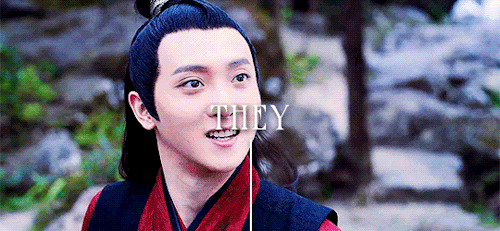
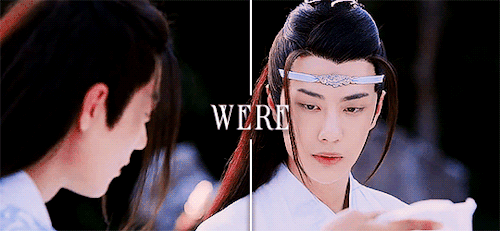
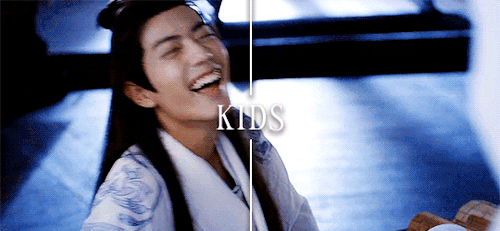
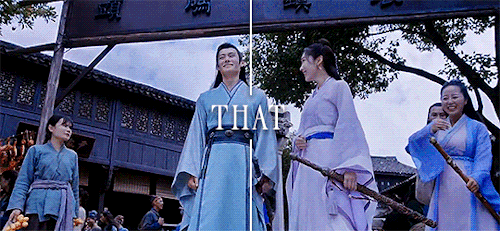
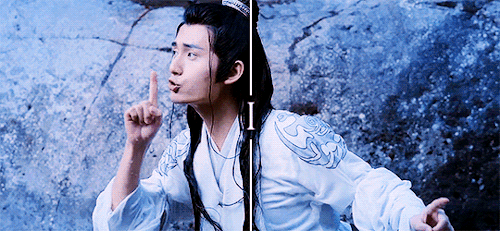
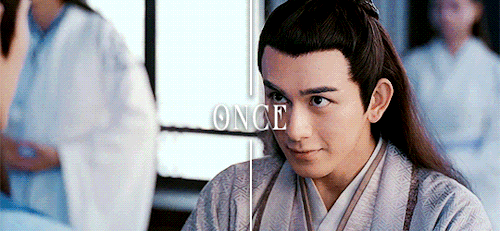
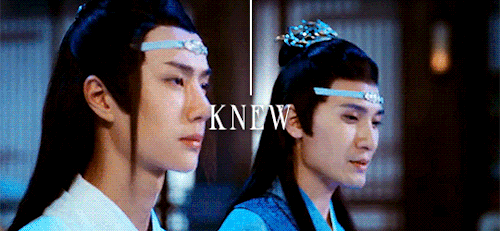
Now they’re all dead hearts to you
Untamed Fall Fest: Day 28 - Decay
lwj is almost as guilty for all the things jc is criticised for
Everyone is guilty for all the things Jiang Cheng is constantly criticized for. Torturing cultivators? Check. Not helping the Wen remnants? Check. Not standing by Wei Wuxian? Check. Shouting? Check. Lying? Check. Being an asshole at some point in their life? Absolutely check.
Everyone jokes around about the Lan’s Silencing Spell, including myself, but um, using your sect’s magical coercion spell to silence someone else’s voice multiple times is actually kind of fucked up? Nobody says anything about the Lans and Nies being equally, if not more so, complicit in what ends up happening with the Wens and Wei Wuxian, but it’s still Jiang Cheng who gets the most criticism, and I will never be okay with this.
Hell, Wei Wuxian himself committed pretty much all of these! As much as we love Wei Wuxian for his endlessly giving heart, we should keep in mind that he also didn’t do anything about the Wens until Wen Qing and Wen Ning were involved. That isn’t a criticism. That is just the nature of the society and culture that they live in, where blood feuds are a thing and wiping out a clan who killed your family is simply an equal and just exchange regardless of individual involvement. Wei Wuxian committed a massive cultural taboo for helping the Wen remnants. That isn’t to say he shouldn’t have helped, or that everyone isn’t complicit in the death of a bunch of villagers who were trying to move on, but that responsibility and criticism certainly shouldn’t only land squarely on Jiang Cheng’s shoulders.
Especially when Jiang Cheng was still little more than a child himself. The Jiang sect was completely wiped out. Jiang Cheng was barely holding onto any political power as it is. They were being intentionally left out of political meetings by the other three sects. They were extremely vulnerable to being swallowed up and becoming subsidiary to the Jin sect. Jiang Cheng had an immense responsibility to his people who walked with him through war when he had nothing to offer them at time other than his word, and part of that responsibility was to not go around pissing off your next door neighbors who had a hell of a lot more power than you do at the moment.
And amidst of all this, Jiang Cheng was being actively lied to the entire time! He couldn’t possibly have known that Wei Wuxian, his genius cultivator shixiong, no longer had a golden core, whose only option was now demonic cultivation and who was neck deep in a veritable thunderstorm of trauma and self-hatred. Especially when Wei Wuxian was constantly telling him he was fine. Especially when Wei Wuxian was doing everything he could to make sure Jiang Cheng could never know the truth. While I do think Jiang Cheng was wrong about what options were available to him, I personally think he was the least obligated out of everyone to help.
You know whose sects didn’t get wiped out? Who still had political power and was actually at the table when the remaining Wens and labor camps were being discussed? Who still had experienced disciples and opinionated elders? Who had at least much more experience navigating the complicated web of political manipulations than Jiang Cheng? The Lans. The Nies. Both equally capable of putting a stop to Jin Guangshan. Both equally responsible for the murders of a bunch of villagers. Both absolutely one hundred percent more obligated to do so and in a position where it was possible than Jiang Cheng was.
But sure, let’s freaking blame the traumatized teenager whose family and sect were slaughtered for not being able to help.
I just have a lot of Jiang Cheng feelings today, Okay??
Genuinely baffled by arguments which insist that it’s only Jiang Cheng who has to improve himself instead of being jealous or insecure, that Wei Wuxian should heal away from him because Jiang Cheng is a source of toxicity.
First of all, they’re both dumbasses. Let’s not get ahead of ourselves.
Second of all, Jiang Cheng’s parents were assholes who simultaneously made him believe he was inherently not good enough to save their shitty marriage and also that that was because of Wei Wuxian, his brother and best friend whom he chooses again and again to love in spite of all of this. He then had his entire clan and sect slaughtered; chose to sacrifice himself to save his brother, whom he loves by the way in case you missed that, thereby giving up the chance to avenge his family and sect; and had nonconsensual surgery performed on him (and lied to about it repeatedly for the next decade).
He then had to take over running a small nation all by himself because Wei Wuxian, his brother who promised to stand by his side, fucks off to demonic cultivation and pushes him away with absolutely no explanation; is extremely socially disrespectful while being a representative of their already vulnerable sect; causes a massive political scandal which includes threatening to kill a sect leader’s nephew and murdering a whole bunch of people with a zombie; and hits with pinpoint accuracy every last one of Jiang Cheng’s insecurities about not being good enough for the people he loves to stay with him while still refusing to offer an explanation. And in response to all of this, Jiang Cheng:
(1) Arranges for a staged fight so that Wei Wuxian can continue protecting the Wens without political ramifications to the Jiang sect. (Something that Wei Wuxian also wants by the way because the safety of their sect is important to him, too!)
(2) Brings their sister to Yiling for a surprise wedding dress and incoming nephew reveal so that Wei Wuxian can still be a part of the celebration, and then gives Wei Wuxian the opportunity to name their sister’s first born son and tries his very best to ask Wei Wuxian to come home.
(3) Is still perfectly agreeable to having Wei Wuxian, a year later, come to their nephew’s one-month birthday celebration and reinstated into their sect.
What Jiang Cheng gets in return is Wei Wuxian refusing to come home and walking away from him; Wei Wuxian losing control of his emotional support zombie who ends up fatally punching their brother-in-law through the heart and making their sister a grieving widow; Wei Wuxian recklessly taking on the entire cultivation world and losing control of his demon magic that he swore up and down that he had under control which gets their sister killed; and Wei Wuxian dying and leaving him alone with an orphaned infant nephew. And in response all of this, Jiang Cheng:
(1) Never gets any dogs.
(2) Doesn’t alert anyone that Wei Wuxian has returned to life.
(3) Allows Wei Wuxian to be near Jin Ling.
(4) Keeps Chenqing safe for 13/16 years, then returns it and not only allows but trusts Wei Wuxian to play it in front of their nephew without getting their favorite people killed again.
Did Jiang Cheng believe, do, and say some fucked up shit that he should reflect pretty hard on? Of course! Who didn’t? This was never a story about perfect characters.
But someone did most of the walking away in this sibling relationship regardless of how sympathetic and heartbreaking his reasons were, and it wasn’t Jiang Cheng. He has a right to be angry about Wei Wuxian’s reckless regard for his own life and the disastrous consequences it had for both of them and their family, and it isn’t because he’s fucking jealous.
Lastly, Wei Wuxian is not a hapless innocent victim who can do no wrong. Please stop treating my wonderfully complex and violently pragmatic disaster son with both a heart of gold and a kind of love that can destroy the entire world like he is. Thank you for coming to my TED talk.
i feel like as a fandom we do not spend enough time dissecting how fucked up the scene described here is.
“Young Master Wei, that night, you took the two halves of the Stygian Tiger Seal and pieced them together. After you were satisfied with the killing, you were a spent arrow as well. WangJi was injured on your rampage. He was in no better shape than you, barely supporting himself by leaning on Bichen. In spite of this, as he saw you stumble away, he immediately followed.
“Right then, not many people were still conscious. I, too, was almost unable to move, and I could only watch as WangJi, whose spiritual powers were clearly about to be drained, staggered towards you. He brought you onto Bichen as soon as he grabbed you, and you two left.”
just. the mental image of lxc being so injured and so drained of spiritual energy that he can only watch helplessly as his brother continues to aid the man who did this to him - to all of them - is fucking breaking me.
Keep reading
Do not be daunting and immovable, do not be inflexible and stern, limit neither your growth nor your movement. Do not be a mountain for they are reduced to dust by little more than slight rains and soft winds.
Be water, flow through life picking up wisdom but don't let it overburden you. Be transient, change your form as and when required. Be as hard and cold as ice, rise up to the skies when the land becomes too unkind, let yourself be dragged through sewers if that'll keep you alive and revert back to your original form when the conditions suit you. But most importantly, don't lose the sight of your true nature through all this.
Be water.
Chapters: 2/? Fandom: 陈情令 | The Untamed (TV) Rating: Teen And Up Audiences Warnings: Creator Chose Not To Use Archive Warnings Relationships: Jiāng Chéng | Jiāng Wǎnyín/Lán Huàn | Lán Xīchén, Lán Zhàn | Lán Wàngjī/Wèi Yīng | Wèi Wúxiàn, Jiāng Yànlí/Jīn Zǐxuān, Mèng Yáo | Jīn Guāngyáo/Niè Míngjué, Niè Huáisāng & Wēn Níng | Wēn Qiónglín Characters: Wèi Yīng | Wèi Wúxiàn, Jiāng Chéng | Jiāng Wǎnyín, Lán Zhàn | Lán Wàngjī, Lán Huàn | Lán Xīchén, Jiāng Yànlí, Jīn Zǐxuān, Wēn Níng | Wēn Qiónglín, Wēn Qíng (Módào Zǔshī), Original Characters Additional Tags: Fluff and Angst, Murder Mystery, Alternate Universe - Modern Setting, Non-Sexual Intimacy, Slow Burn, Misunderstandings, Eventual Happy Ending Summary:
Jiang Cheng has known all his life that things don't last. Love, friendship, bonds all are temporary and so he finds comfort in his routine life circling between his work and a social life consisting of handful of friends.
But when he encounters a strange case and a stranger Lan Xichen after a fateful string of events, he is forced to reassess his values.
Updated the thing 😬😬

so here’s the tea sis-
When I see people saying that Jiang Cheng and Lan Xichen had bad endings…
I’m honestly confused. Because the context of the novel makes it very clear they will have a happy future and ending, all things considered, by how it reveals the parent who was in a similar situation and their fates being so strongly contrasting.
Which is to say, Yu Ziyuan and Qingheng-Jun are dead. Jiang Cheng and Lan Xichen are alive.
By being alive, by having the chance to learn and grow from their mistakes, they can earn their way to a happy ending. They can’t have one immediately. They are reaping what they sowed; Jiang Cheng spent years under a delusion and operating on anger alone (though he did his best to moderate himself around Jin Ling) and Lan Xichen put his trust and faith in the absolutely wrong person and spent years in an abusive relationship.
Yes, abusive relationship. Doesn’t even have to be romantic for it to be abusive in nature. We see Lan Xichen being gaslit by Jin Guangyao, we see him constantly lie to him, and we see how he’s harmed him in many ways with what he did. Lan Xichen has to come to terms with that.
Jiang Cheng unburdens himself, lets go of a relationship that became toxic for him and in particular for Wei Wuxian, and is mentioned to have interfered with Jin Sect to help Jin Ling. In the past, as early as the Cloud Recesses arc, Jiang Cheng was someone who never rocked the boat and went with the whole of society to avoid getting (negative) attention. The fact he’s able to do that, to avoid too much of a fuss when he meets Wen Ning on a night-hunt, that means Jiang Cheng is putting work into things. It’s getting better.
Lan Xichen certainly goes into seclusion, but it’s more for his mental health and dealing with things. “Seclusion” actually has like three meanings (at the least) in the original language from what I know; closed door training, seclusion as in mental retreat, and seclusion for punishment. Lan Xichen isn’t punishing himself, he’s taking time away from society. And not so much that he avoids a family banquet! He might be absentminded because of everything, but he still showed up so that’s the sign of hope we need that things will get better.
In comparison, we got the parents.
Yu Ziyuan in the novel is 100% an antagonistic force. She never avoids being a poison in others lives. It’s only at the end of her life that we clearly see her softness that is hidden by all the poison barbed spines around her. And even then it’s shadowed by her irrational hate of Wei Wuxian. But we see through how Zidian recognizes Jiang Fengmian that a part of her did trust her husband at least and likely wanted a better relationship. But she dies and so that glimpse comes to nothing.
Minor thing to keep in mind; CQL!Yu Ziyuan is not the same character as MDZS!Yu Ziyuan. I am not talking about CQL!Yu Ziyuan who also was hit by the censor stick of no grey morality same as Jiang Cheng.
Qingheng-Jun is absolutely not there in the novel, only showing up in how people describe him. He’s alive but firmly in seclusion as a form of punishment during Cloud Recesses arc. When he does leave – and I’m sure he did because by the old work sheets Lan Wangji has in the Jingshi (per Banquet extra) not all of Cloud Recesses burned, likely just the main areas like the Library Pavilion and Lanshi – he dies in a fight. He leaves only to die, leaves likely to protect his people and his sons, and he dies in battle.
So yeah, it doesn’t seem like it’s a flat out happy ending. And it isn’t. Everyone outside of the juniors, Wen Ning, and WangXian haven’t yet earned their happy ending yet. They have to put the work in first.
But they are alive and capable of putting the work in. Isn’t that a good ending for them?
-
 mists-of-hithlum liked this · 6 months ago
mists-of-hithlum liked this · 6 months ago -
 0hopelesswanderer0 reblogged this · 7 months ago
0hopelesswanderer0 reblogged this · 7 months ago -
 0hopelesswanderer0 reblogged this · 7 months ago
0hopelesswanderer0 reblogged this · 7 months ago -
 0hopelesswanderer0 liked this · 7 months ago
0hopelesswanderer0 liked this · 7 months ago -
 hohosaidpeiming reblogged this · 8 months ago
hohosaidpeiming reblogged this · 8 months ago -
 hohosaidpeiming reblogged this · 9 months ago
hohosaidpeiming reblogged this · 9 months ago -
 schniggles liked this · 9 months ago
schniggles liked this · 9 months ago -
 teogli reblogged this · 10 months ago
teogli reblogged this · 10 months ago -
 teogli reblogged this · 10 months ago
teogli reblogged this · 10 months ago -
 teogli liked this · 10 months ago
teogli liked this · 10 months ago -
 luna-stavia-black liked this · 10 months ago
luna-stavia-black liked this · 10 months ago -
 snarkissist liked this · 10 months ago
snarkissist liked this · 10 months ago -
 tasha-stasha liked this · 11 months ago
tasha-stasha liked this · 11 months ago -
 gardensofthemoon reblogged this · 11 months ago
gardensofthemoon reblogged this · 11 months ago -
 gardensofthemoon liked this · 11 months ago
gardensofthemoon liked this · 11 months ago -
 ghostgeneralning reblogged this · 1 year ago
ghostgeneralning reblogged this · 1 year ago -
 meteortrails liked this · 1 year ago
meteortrails liked this · 1 year ago -
 faewaren reblogged this · 1 year ago
faewaren reblogged this · 1 year ago -
 somanyquestions46 liked this · 1 year ago
somanyquestions46 liked this · 1 year ago -
 harrietrile17 liked this · 1 year ago
harrietrile17 liked this · 1 year ago -
 thekansta liked this · 1 year ago
thekansta liked this · 1 year ago -
 bluebunny8 liked this · 1 year ago
bluebunny8 liked this · 1 year ago -
 sun-lava liked this · 1 year ago
sun-lava liked this · 1 year ago -
 yizhan-9197 liked this · 1 year ago
yizhan-9197 liked this · 1 year ago -
 avoidscreaming liked this · 1 year ago
avoidscreaming liked this · 1 year ago -
 zrribbonz liked this · 1 year ago
zrribbonz liked this · 1 year ago -
 525hawol08 liked this · 1 year ago
525hawol08 liked this · 1 year ago -
 intercalary-meristems liked this · 1 year ago
intercalary-meristems liked this · 1 year ago -
 lebelinoria reblogged this · 1 year ago
lebelinoria reblogged this · 1 year ago -
 lebelinoria liked this · 1 year ago
lebelinoria liked this · 1 year ago -
 katzkookiesshipping reblogged this · 2 years ago
katzkookiesshipping reblogged this · 2 years ago -
 katzkookiesshipping liked this · 2 years ago
katzkookiesshipping liked this · 2 years ago -
 theturboencabulator reblogged this · 2 years ago
theturboencabulator reblogged this · 2 years ago -
 obsessivefangirlfeels liked this · 2 years ago
obsessivefangirlfeels liked this · 2 years ago -
 midst-ofodera reblogged this · 2 years ago
midst-ofodera reblogged this · 2 years ago -
 midst-ofodera liked this · 2 years ago
midst-ofodera liked this · 2 years ago -
 secretive3amramenmaker reblogged this · 2 years ago
secretive3amramenmaker reblogged this · 2 years ago -
 thepurplewombat reblogged this · 2 years ago
thepurplewombat reblogged this · 2 years ago -
 thepurplewombat liked this · 2 years ago
thepurplewombat liked this · 2 years ago -
 pleasegivejinlingabreak liked this · 2 years ago
pleasegivejinlingabreak liked this · 2 years ago -
 akirahilar reblogged this · 2 years ago
akirahilar reblogged this · 2 years ago -
 akirahilar liked this · 2 years ago
akirahilar liked this · 2 years ago -
 jasmineflower9 reblogged this · 2 years ago
jasmineflower9 reblogged this · 2 years ago -
 jasmineflower9 liked this · 2 years ago
jasmineflower9 liked this · 2 years ago -
 delunaticue reblogged this · 2 years ago
delunaticue reblogged this · 2 years ago -
 delunaticue liked this · 2 years ago
delunaticue liked this · 2 years ago -
 add1ctedt0you liked this · 2 years ago
add1ctedt0you liked this · 2 years ago

Messing up words in my head, but bleeding them out on papers.
34 posts